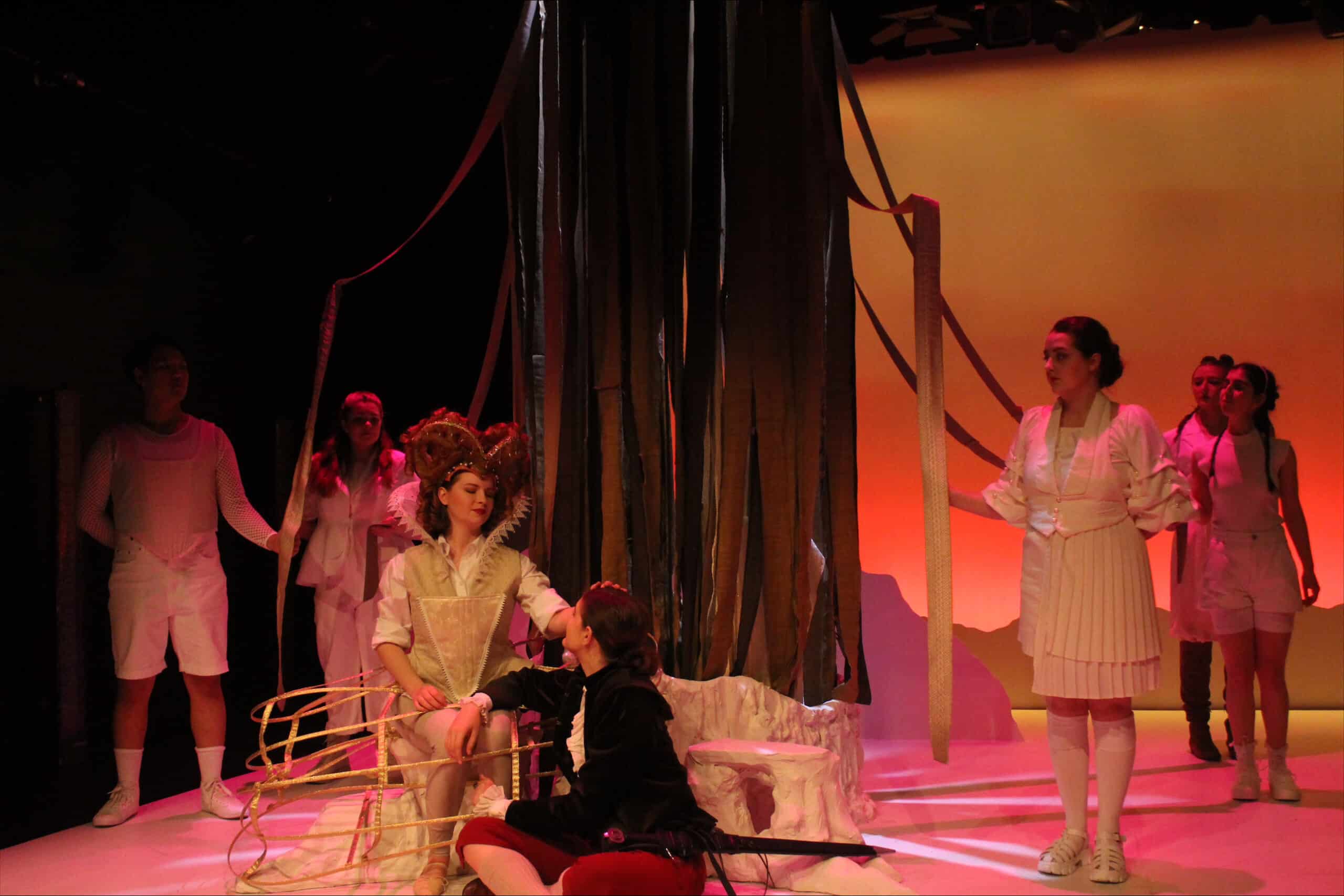Through Gender, Space, and Time: Theatre Erindale’s Orlando might polarize
Execution of production may leave some audience members longing for greater emotional and intellectualize proximity to the performances set before them.
Sarah Ruhl’s adaptation of Virginia Woolf’s classic novel Orlando brings modernist literary tropes on stage. Directed by Tanya Rintoul, Theatre Erindale’s production enacts these tropes in a way that refuses audience immersion. I will critique the distancing effect of Orlando, but I do not wish to impart that the play is not worthy of enjoyment.
There is much to enjoy in Orlando. With a whimsical chorus as his entourage, the titular Orlando (Zoë Bonk) lives until 30 years old before waking as a woman. The century-spanning stream-of-consciousness play ping-pongs through one exceptional life with comedic ease.
The chorus is comprised of fourth-year theatre and drama studies students: Emma Coulson, Kayleigh Croft, Abby Guse, Gabby Ibrahim, Sean Lee, Mia Pagliaroli, and Allie Waddell. Collectively, they excellently differentiated the shifting narrative perspective vocalized through the performers. Moreover, the expressive movement sequences came across beautifully because of this committed ensemble.
Waddell’s decorum as Queen Elizabeth merits special mention. Within the minimalist design, Queen Elizabeth’s structure operates as a focal point grounding the rapid changes of Orlando’s formative years.
The play and cast made so much sense together. When Orlando was announced as a part of the 2023/24 season, I would not have imagined anyone but Bonk as Orlando. Additionally, the comedic repertoire of performers like Guse were able to shine. In turn, they enhanced the wonderfully ridiculous aspects of Orlando.
The set prop and costume design from Leslie Wright and Michelle Vanderheyden complimented one another and implied memorable themes from Woolf’s novel. The all-white surface of the stage (with exposed edges so the audience does not forget that it’s a play) particularly evoked the great frost and skating scenes. These are pivotal to the novel and expand to fill most of the first act of the play.
Furthermore, the genderfluid, era-bending, white whimsical attire communicated apparent ethereality at many moments in the play. I only wish these aesthetics went further throughout the performance space and involved the audience more.
Altogether, the production demonstrated interesting stylistic choices that adapted the form and content of Orlando to the stage. It featured beautiful design and strong performances. As I sincerely hope that stream-of-consciousness performance will go beyond adaptations of modernist work, I would recommend seeing Orlando as a precursor to foreseeable theatrical innovation.
Orlando runs Thursday to Saturday until December 2, 2023. Tickets are available. See it and contend with my strong opinions that follow.
The main reason a performance might encourage distance in the post-modern era is to promote audience criticality. In this case, I felt it was not successful because the performance did not situate the audience. I was too preoccupied with trying to figure out what my place was in the world of the performance to interrogate the themes of the play.
Because Orlando comments on human existence, withholding this experience through distance seems to imply the falsity of Orlando’s existence. This could be the point of the play. I acknowledge the satire and gimmick of Woolf writing her novel as a biography, but I do not think that it is the essential element of the novel to adapt and communicate formally.
As an adaptation, distancing is also inherent with comparing the similarities and differences to the source material. It is also present in the stream-of-consciousness. I think that the spatial distancing in Theatre Erindale’s production intended to enhance these. However, for me, it resulted in too much disconnect.
A clear overarching framework of the performance and audience relationship, greater continuity in the rules of lighting shifts with narrative shifts, and more visibility to the performers overall would have immersed me further in the experience. A reconfiguration of the space with attention to the performance setting would have been preferable.
For me, the audience is of the utmost importance. Perceiving failure to situate the audience’s experience of a performance will always detract from my enjoyment of a play. I encourage everyone to see more theatre and discover where lies the “one thing you can’t get past,” there might lie a source of passion.
Theatre Erindale Correspondent (October-November, Volume 50) — Avery is a third-year student double majoring in Dramaturgy and Drama Studies and Women, Gender, and Sexuality Studies at UTM. Academically and in practice, they are particularly interested in how audiences are situated within theatre experiences. Their writing includes plays, essays, articles, and poetry.


